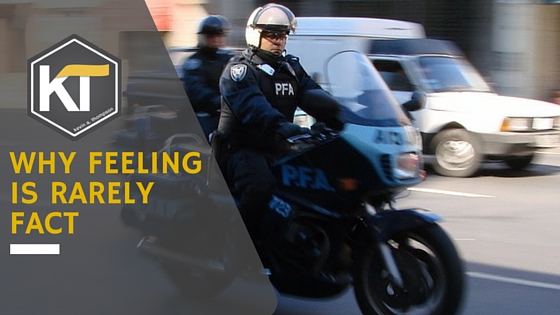In response to some concern, please note: the headline is about why my feeling is not fact. I am not trying to diminish the feeling of police officers or their families regarding the real danger in their jobs. While writing on decision making, I used this illustration to offer encouragement to those wearing the badge.
#BlueLivesMatter
The hashtag has become popular over the past few months as American police officers are under attack. Threats have been made. Assassinations have been carried out. It’s a scary time to be a police officer in America. (See: Trans-affluent–The Great American Deception)
When the headlines reported another attack on an innocent American police officer, I was overcome with sorrow. I have a deep respect for law enforcement. Every day, thousands of men and women leave their homes and families in order to protect mine. They leave without knowing if they will return.
While a few officers have not lived up to their oath of honor, most officers bring dignity to their badge through their integrity, character, and in recognition of the public trust.
Sadly, many officers are under attack. Gangs have put out hits. Common citizens have shown disrespect. And in multiple circumstances over the past few weeks, officers have died in the line of duty.
The situation is so dire it is gripping national headlines. It feels overwhelming. (See: You Are Never Off the Record)
Yet, the national statistics show a shocking story. While the current threats are real and must be confronted, this is the safest time to be a police officer in nearly 100 years. If the year continues on the current track, the last three years could report the lowest number of police officer fatalities since 1942-1944. Of course local deaths during those years would be lower because of war, so if you remove years of world war, these three could be the lowest since 1908-1910. And that’s total number of deaths, it doesn’t take into account rise in population rates and the number of police currently serving. As a percentage of population, the number of police deaths have never been lower. (See: National Law Enforcement Officers Memorial Fund for statistics)
While the number of officers killed in the line of duty has increased this year over last, it has only increased in traffic related accidents. Deaths by firearms are actually down 24% (as of September 9, 2015). Police officers actually have a fatality rate half of that of truck drivers. It is lower than the homicide rate in some American cities.
While the current threats are real, the statistics say there has never been a safer time to be a police officer in America. Perception says it’s never been more dangerous. Statistics say it’s never been more safe (although it is clearly dangerous). What does this divide mean to us?
1. It should remind us that feeling is rarely fact. Feelings are important. They should be recognized and understood. Stoicism is not a valid option when it comes to living in this world. However, while recognizing our feelings, we should not deify them. We cannot allow our feelings to rule our lives because our feelings are often wrong. They are incomplete. They tell a false story. (See: When You Feel What No One Else Has Ever Felt)
2. It should remind us the media rarely tells the whole truth. It’s not that the media intentionally lies to us. It’s that they are just as susceptible to human deception as the rest of us. Remember: the modern media is about selling advertising not telling the truth. This need to sell compromises their ability to be objective and honest. Tomorrow’s headline will not likely be about something which has stayed the same. Interest comes with something that is new, different, or changing.
3. It should give us caution when making decisions based on current trends. We are easily deceived. Because of this, we need to act with extreme care regarding life changing decisions based on current events. As a matter of fact, one line of thinking says humanity is so bad regarding current information that we should do the opposite of what we feel. Many brokers believe it is a good time to buy stocks when the media is reporting a crash and a good time to sell stocks when the headlines are about a roaring market. (See: Start Making Good Decisions)
4. It should make us question everything we know to be true. A poll was recently conducted in which researchers intentionally switched the opinions of two political candidates to see if their constituents would switch loyalty to both party and candidates. Even with their opinions switched, voters stayed the same. Chances are, many of our opinions have nothing to do with the facts. We have made assumptions which are wrong.
5. It should leave us with an open mind. Because we are so easily deceived, we should be open to new information and to changing our minds. Sadly, many believe changing an opinion is a sign of weakness. However, it is actually a sign of strength. The ability to change one’s mind shows humility, consideration, and a true engagement of one’s mind with our surroundings. If you can’t think of an opinion you have recently changed, you probably aren’t thinking very much.
It’s a scary time to be a police officer. Anytime groups are threatening officers, we must take it seriously. However, we should also celebrate the decrease in police officer deaths over the past thirty years and we should continue to find ways to keep our officers safe.
In many areas of life, perception does not match reality. Knowing this divide can prevent us from wrong assumptions, bad decisions, and living in undue fear.




4 Responses to Why Feeling Is Rarely Fact